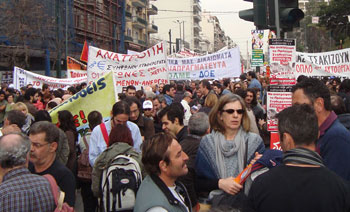(lead article)
Greek gov’t to deepen
austerity measures
Pushes workers to pay for capitalist crisis

|
|
Aspasia Kanellou
|
|
March in Athens, Greece, during February 24 strike against government austerity measures.
|
BY SETH GALINSKY
The Greek government says it will deepen austerity measures already begun against working people to narrow a large government budget deficit.
“Brutal steps” are needed “to address the immediate dangers today,” Prime Minister George Papandreou told the Greek parliament February 26. “Tomorrow it will be too late and the consequences will be much more dire.”
In early February Papandreou had announced wage cuts for government workers, who make up one-third of the workforce; raising the retirement age to 63; and big tax increases that will hit workers and small farmers the hardest.
The government said the measures are needed to obtain loans and sell bonds to pay off $75 billion in debt to Greek and foreign banks that starts coming due in March. Greece’s government debt is 113 percent of the country’s gross domestic product.
Two days before his speech, some 40,000 people marched in Athens during a one-day strike to protest the austerity plans. It was called by the three main union federations, including two closely tied to Papandreou’s Panhellenic Socialist Movement. Many marchers carried banners that said, “Working people should not be made to pay for the crisis that we did not create.”
The strike, which closed down air and rail transport, public services, the shipyards, oil refineries, and ports, was centered among government workers. It involved a much smaller percentage of private-sector workers. Although air traffic controllers joined the strike, many ground workers did not.
The march included small contingents from workplaces, many with their own demands. Workers in the newspaper industry called for the reinstatement of fired colleagues and laid off Olympic Airlines workers, whose unemployment benefits are running out.
Union officials, however, did not challenge the government’s claim that the budget deficit needs to be narrowed nor did they put forward a program to unite working people in the face of the capitalist economic crisis.
Instead, Yiannis Panagopoulos, president of the General Confederation of Greek Workers, stated, “Our problem is that the sacrifices being proposed are not fair, they fall on working people, they should be shared evenly.”
Leaders of the European Union, especially the German government, have been pushing Athens to carry out deeper austerity measures. The crisis has sharpened tensions between the competing capitalist classes in Germany and Greece.
In an editorial, the German daily Bild said that “the proud, cheating, profligate Greeks” ought to be “thrown out of the euro on their ear.” The paper was referring to reports that previous Greek governments had underreported their real debt to be accepted into the European Union and the euro zone, countries that replaced their national currencies with the euro.
Greek deputy prime minister Theodoros Pangalos charged that the German government shared the blame because it had wrecked the Greek economy and slaughtered thousands during the Nazi occupation of World War II. “They took away the gold that was in the Bank of Greece, they took away Greek money, and they never gave it back,” he said.
German banks have some $43.2 billion in loans outstanding in Greece; French banks hold $75.5 billion. But Greek bankers reportedly hold more than $100 billion in Greek government bonds and loans.
More measures are expected, such as raising the value-added tax, which now stands at 19 percent, and steeper cuts in the wages of government workers.
Natasha Terlexis and Georges Mehrabian in Athens contributed to this article.
Related articles:
Fighting the dictatorship of capital
| 


